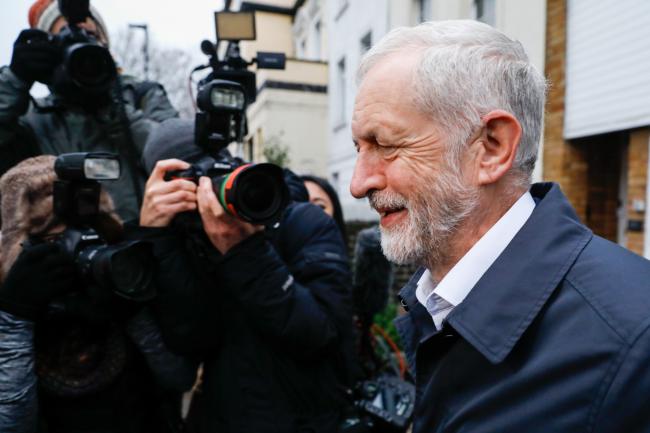(Bloomberg) -- U.K. opposition Labour Party Leader Jeremy Corbyn has bowed to pressure from his members of parliament and agreed to support a new Brexit referendum. The pound rose.
Corbyn is a lifelong opponent of Britain’s European Union membership and has until now resisted attempts to get him to back a fresh vote on leaving the bloc -- even though it is the policy the party agreed to last year. But nine lawmakers quit Labour last week in protest at his leadership, and there were reports that others might go unless he changed course.
After a meeting with members of his shadow Cabinet on Monday afternoon, the Labour leader finally gave way.
“One way or another, we will do everything in our power to prevent no-deal and oppose a damaging Tory Brexit based on Theresa May’s overwhelmingly rejected deal,” Corbyn told a meeting of Labour MPs on Monday evening, according to his office.
“That’s why, in line with our conference policy, we are committed to also putting forward or supporting an amendment in favor of a public vote to prevent a damaging Tory Brexit being forced on the country.”
Paralysis
In just over a month, the U.K. is meant to be departing the union it’s belonged to for 40 years but the outlook has never looked more uncertain. May’s hands are increasingly tied by an unpopular divorce deal she sealed with the EU but that Parliament has rejected by a landslide. Brexit has proved to be such a divisive issue that both mainstream parties have suffered defections, businesses are panicking and voters are confused and exasperated.
Corbyn’s U-turn -- he has long resisted pressure to back a second plebiscite -- comes as the U.K. is in the throes of political crisis. It’s unclear when Labour will even get a chance to show this support. There will be votes on Wednesday on the direction of Brexit, but no amendments have been presented yet.
It’s not clear what kind of referendum Labour proposes. While the party’s foreign affairs spokeswoman Emily Thornberry said it would be a choice between leaving the EU with a negotiated deal or staying in, a person familiar with Corbyn’s position said this hadn’t been decided. But even with Labour’s support, another referendum is far from certain to happen.
Even if all 246 Labour MPs voted for one -- along with the 65 other opposition MPs who might back one, and around 10 members of May’s Conservative party -- they would only just have a majority. In reality, at least 25 Labour MPs would disobey any instruction to vote for a referendum. When Corbyn set the policy out to MPs in a private meeting, at least one could be heard angrily denouncing it.
A repeat of the referendum is only likely to happen if a significant number of Tories back one. That’s the idea behind a suggestion by Labour MPs Peter Kyle and Phil Wilson -- that they should offer to vote for May’s Brexit deal in exchange for her agreeing to a referendum on it.
May has repeatedly argued against a repeat of the 2016 referendum, saying that it would undermine faith in democracy, and any change of position would outrage her torn party.
However, it will give her ammunition to persuade hardliners who consider her deal a travesty that they could lose Brexit altogether if they don’t back it when it returns to Parliament.
(Adds doubt about referendum question in eighth paragraph.)
